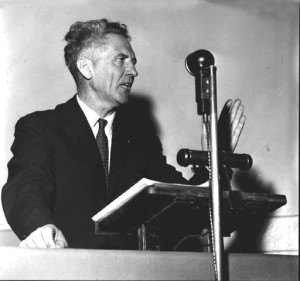The death of a giant June 3, 2009
Posted by Sverre in : Norwegian politics , comments closedOn May 25th a giant in Norwegian politics, passed away. Haakon Lie might not be very well known to foreginers, but he was certainly one of the most influential people in Norway in the 20th century. He was a man of many controversies, but it is hard not to respect his role in building social democracy in Norway.
 He was party secretary of the Labour party from 1945 to 1969, a period through which the Labour party was in government for most of the time. The joint leadership between Lie and the most prominent prime minister during the period, Einar Gerhardsen has become famous in Norwegian politics both for its effectiveness in building the country and for its latter days bitter rivalry.
He was party secretary of the Labour party from 1945 to 1969, a period through which the Labour party was in government for most of the time. The joint leadership between Lie and the most prominent prime minister during the period, Einar Gerhardsen has become famous in Norwegian politics both for its effectiveness in building the country and for its latter days bitter rivalry.
Lie was one of the people who rebuilt the Labour party from a party of class struggle to a broader mass party building the welfare state on a compromise between capitalism and socialism. He was one of the ideologers that formed a new kind of socialism where anti-capitalism was replaced by a modern social democratic quest for liberty for all. In domestic policy he pushed for social reforms along with his comrade in arms Gerhardsen.
In foreign and security policy he was much more controversial. He was driven by a distaste for communism whose anti-democratic tendencies he felt was a corruption of socialism. He feared its spread and favoured NATO membership and nuclear armament. (more…)
NYT sings the praise of Norwegian economic management May 14, 2009
Posted by Sverre in : Norwegian politics, Political economy, Public Policy , comments closed“As a socialist, I have always said that the market can’t regulate itself,” she said. “But even I was surprised how strong the failure was.”
These are the words of Norway’s Finance Minister Kristin Halvorsen from the political party Socialist Left (SV), which is part of the current centre-left government coalition in Norway. The words come from an article in the Global Business section of The New York Times, which praises the economic management of the Norwegian state, among other things how it has stuck with its social democratic welfare model through boom and bust.
The global financial crisis has brought low the economies of just about every country on earth. But not Norway.
With a quirky contrariness as deeply etched in the national character as the fjords carved into its rugged landscape, Norway has thrived by going its own way. When others splurged, it saved. When others sought to limit the role of government, Norway strengthened its cradle-to-grave welfare state.
And in the midst of the worst global downturn since the Depression, Norway’s economy grew last year by just under 3 percent. The government enjoys a budget surplus of 11 percent and its ledger is entirely free of debt.
The debt free government is of course something the current centre-left coalition can’t take the credit for alone. The Norwegian government has passed between Labour, centre-right and centre-left governments for the last decade. Since 1990, there has been a broad consensus in the Norwegian parliament for a programme of national savings in a government pension fund, to preserve value for future generations and avoid “Dutch disease“. I mentioned this policy in an earlier post on this blog.
The description of Norway as always sticking with its welfare model is another issue, though. Norway did go through a phase of privatization of welfare, for example the schooling system, during the last government, but this was abruptly stopped by the centre-left Stoltenberg administration when it came into power four years ago. Of course this didn’t necessarily affect government expenditure.
If the right wing were to come into power in the upcoming parliament elections, we might see another shift in this policy. Although supportive of the need for government stimuli to the economy, their preferred stimuli come in the form of tax cuts rather than the countercyclic government expenditures the current government favours. Last week’s conservative party congress heavily emphasized this.
(Hat tip to Tromp for bringing this to my attention).
Norway goes Keynesian January 26, 2009
Posted by Sverre in : Norwegian politics, Political economy , comments closed The ongoing finance crisis has certainly given classic Keynesianism a new boost. And few countries have embraced this as clearly as Norway did today. The center-left government under Prime Minister Jens Stoltenberg from Labour (Arbeiderpartiet) and Finance Minister Kristin Halvorsen from the Socialist Left Party (Sosialistisk Venstreparti) introduced a massive expansion package aimed at combating unemployment.
The ongoing finance crisis has certainly given classic Keynesianism a new boost. And few countries have embraced this as clearly as Norway did today. The center-left government under Prime Minister Jens Stoltenberg from Labour (Arbeiderpartiet) and Finance Minister Kristin Halvorsen from the Socialist Left Party (Sosialistisk Venstreparti) introduced a massive expansion package aimed at combating unemployment.
The package expands the national budget directly with about 2o billion NOK (roughly 2.2 billion € or 2.86 b$), with nearly 17 billions increased expenditure and over 3 billion worth of tax cuts. With secondary effects, the government estimates a total expansive effect of 27 billion NOK, reducing the substantial oil-boosted government surplus. When correcting for petroleum-based offshore income, the government now estimates a government deficit of 119 billion NOK for 2009. This sums up to an expansion of the oil-corrected government budget of 2.3%, substantially higher than the 1.5% goal set by the EU. (more…)